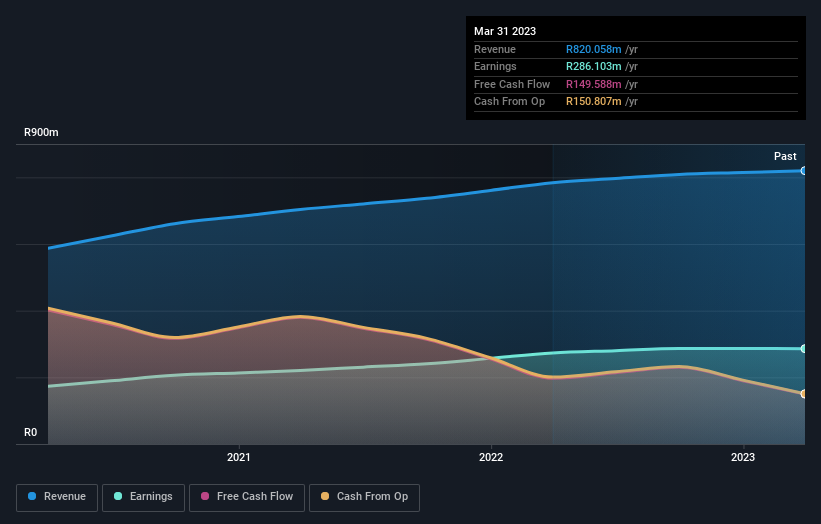Stock Analysis
- South Africa
- /
- Capital Markets
- /
- JSE:SYG
Sygnia Limited (JSE:SYG) adds R434m in market cap and insiders have a 39% stake in that gain

Key Insights
- Significant insider control over Sygnia implies vested interests in company growth
- The top 2 shareholders own 60% of the company
- Ownership research, combined with past performance data can help provide a good understanding of opportunities in a stock
If you want to know who really controls Sygnia Limited (JSE:SYG), then you'll have to look at the makeup of its share registry. And the group that holds the biggest piece of the pie are individual insiders with 39% ownership. That is, the group stands to benefit the most if the stock rises (or lose the most if there is a downturn).
Clearly, insiders benefitted the most after the company's market cap rose by R434m last week.
Let's delve deeper into each type of owner of Sygnia, beginning with the chart below.
View our latest analysis for Sygnia

What Does The Lack Of Institutional Ownership Tell Us About Sygnia?
Institutional investors often avoid companies that are too small, too illiquid or too risky for their tastes. But it's unusual to see larger companies without any institutional investors.
There could be various reasons why no institutions own shares in a company. Typically, small, newly listed companies don't attract much attention from fund managers, because it would not be possible for large fund managers to build a meaningful position in the company. It is also possible that fund managers don't own the stock because they aren't convinced it will perform well. Sygnia might not have the sort of past performance institutions are looking for, or perhaps they simply have not studied the business closely.

Sygnia is not owned by hedge funds. Sapayoa Investments Proprietary Limited is currently the largest shareholder, with 30% of shares outstanding. With 30% and 6.2% of the shares outstanding respectively, Simon Peile and Andre Crawford-Brunt are the second and third largest shareholders.
A more detailed study of the shareholder registry showed us that 2 of the top shareholders have a considerable amount of ownership in the company, via their 60% stake.
Researching institutional ownership is a good way to gauge and filter a stock's expected performance. The same can be achieved by studying analyst sentiments. We're not picking up on any analyst coverage of the stock at the moment, so the company is unlikely to be widely held.
Insider Ownership Of Sygnia
The definition of an insider can differ slightly between different countries, but members of the board of directors always count. Management ultimately answers to the board. However, it is not uncommon for managers to be executive board members, especially if they are a founder or the CEO.
Most consider insider ownership a positive because it can indicate the board is well aligned with other shareholders. However, on some occasions too much power is concentrated within this group.
It seems insiders own a significant proportion of Sygnia Limited. It has a market capitalization of just R3.0b, and insiders have R1.2b worth of shares in their own names. This may suggest that the founders still own a lot of shares. You can click here to see if they have been buying or selling.
General Public Ownership
The general public, who are usually individual investors, hold a 31% stake in Sygnia. This size of ownership, while considerable, may not be enough to change company policy if the decision is not in sync with other large shareholders.
Private Company Ownership
We can see that Private Companies own 30%, of the shares on issue. It might be worth looking deeper into this. If related parties, such as insiders, have an interest in one of these private companies, that should be disclosed in the annual report. Private companies may also have a strategic interest in the company.
Next Steps:
While it is well worth considering the different groups that own a company, there are other factors that are even more important. Case in point: We've spotted 2 warning signs for Sygnia you should be aware of.
Of course this may not be the best stock to buy. Therefore, you may wish to see our free collection of interesting prospects boasting favorable financials.
NB: Figures in this article are calculated using data from the last twelve months, which refer to the 12-month period ending on the last date of the month the financial statement is dated. This may not be consistent with full year annual report figures.
Valuation is complex, but we're helping make it simple.
Find out whether Sygnia is potentially over or undervalued by checking out our comprehensive analysis, which includes fair value estimates, risks and warnings, dividends, insider transactions and financial health.
View the Free AnalysisHave feedback on this article? Concerned about the content? Get in touch with us directly. Alternatively, email editorial-team (at) simplywallst.com.
This article by Simply Wall St is general in nature. We provide commentary based on historical data and analyst forecasts only using an unbiased methodology and our articles are not intended to be financial advice. It does not constitute a recommendation to buy or sell any stock, and does not take account of your objectives, or your financial situation. We aim to bring you long-term focused analysis driven by fundamental data. Note that our analysis may not factor in the latest price-sensitive company announcements or qualitative material. Simply Wall St has no position in any stocks mentioned.
About JSE:SYG
Sygnia
Sygnia Limited, a financial services group, provides investment management and administration services to institutional and retail clients in South Africa.
Excellent balance sheet with proven track record.

